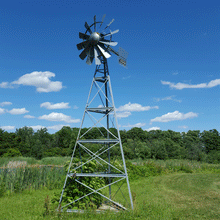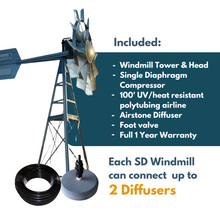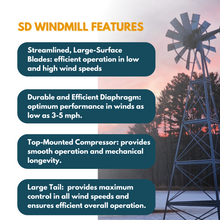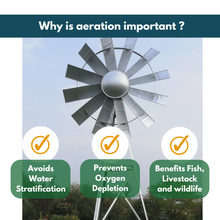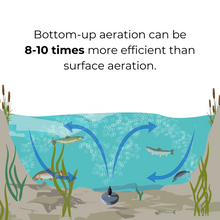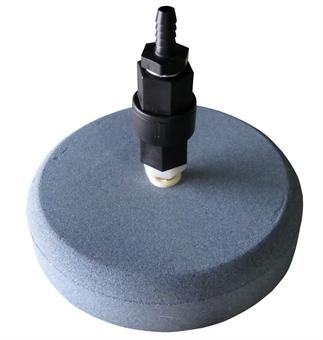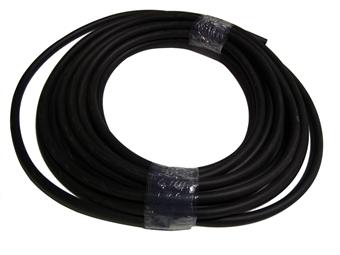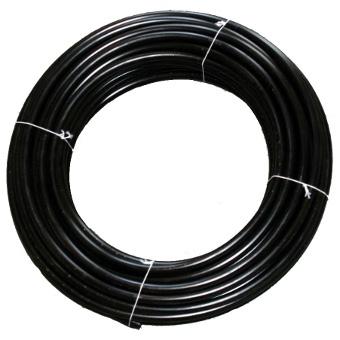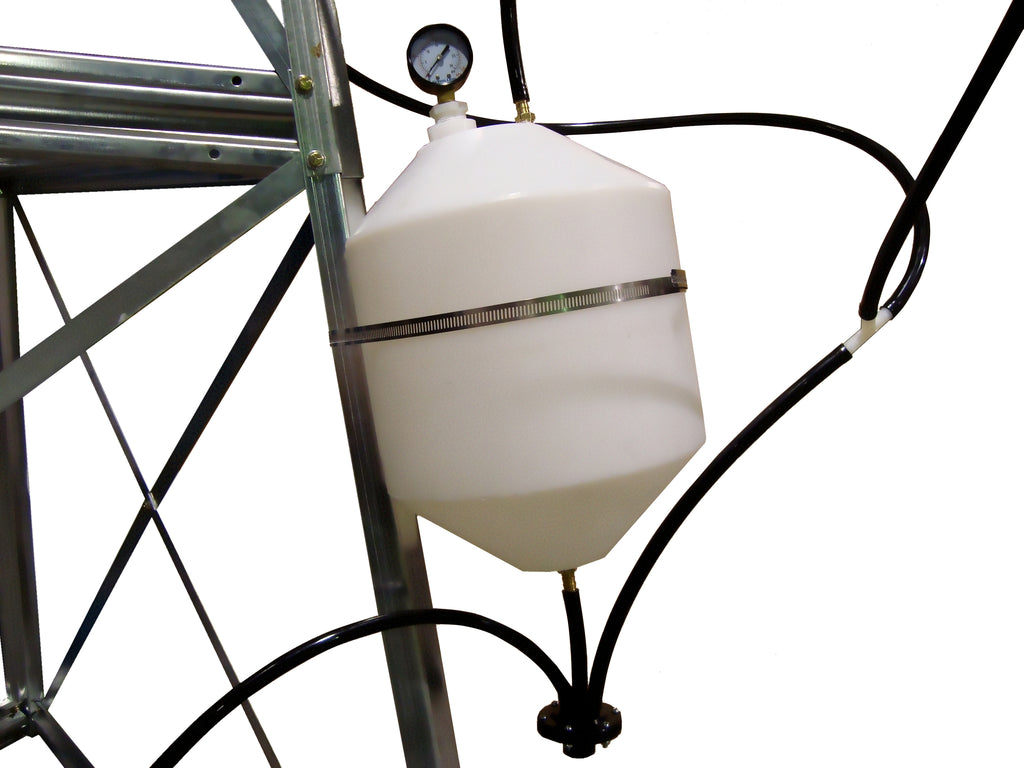
Harness the power of the wind and save money on your energy bills with our Single Diaphragm Windmill Aeration System.
Features & Benefits:
- Ideal for smaller ponds up to one Acre
- The system can transfer up to 25,000 cubic feet of oxygen per month into your water source.
- Runs up to two airstones.
- Works in low wind conditions with as little as 3-5 mph
- Provides bottom-up aeration for your pond, encouraging oxygenation of the water.
- Vent off unwanted gases.
- Prevent stagnant water, pond turnover, and fish kills.
- Galvanized windmill for enhanced durability in harsh environmental conditions.
Included:
- Windmill head and tower.
- Single Diaphragm Compressor
- 100’ of UV and Heat Resistant Poly Tubing Airline
- 1 Airstone Diffuser with Foot Valve.
- Full 1-year warranty
Please see the sections below to learn more about the SD Windmill Aeration System
Windmill aeration is an eco-friendly and cost-effective method for increasing oxygen levels in ponds and lakes. By harnessing the power of wind, a windmill aerator operates a compressor that pumps air through a tube to a diffuser located at the bottom of the water body. This creates a continuous flow of bubbles that rise to the surface, promoting oxygenation and improving water quality.
Windmill aeration systems are particularly beneficial for remote or off-grid locations, as they do not require electricity to operate, making them an ideal solution for enhancing aquatic environments and supporting healthy ecosystems anywhere.
Each SD Windmill can connect up to 2 diffusers.
Selecting the your Windmill Height
When selecting the height for your windmill aeration system, it is crucial to consider that a taller tower enables the windmill to access a greater amount of wind. However, it is also important to be aware of the height of nearby trees and objects that may obstruct the flow of wind to the aerator.
Single Diaphragm Windmill Aerator sizes: 12’, 16’,20’ and 24'
Features
Crankshaft and Bearings: 1" turned, ground and polished steel crankshaft. Long-lasting, heavy duty and durable sealed bearings.- Streamlined, Large-Surface Blades: Engineered for the most efficient operation in low and high wind speeds
- Durable and Efficient Diaphragm: Allows windmill to save energy but still produce maximum air volume and maximum longevity.
Patented design and diameter allow for optimum performance in winds as low as 3-5 mph. 1/2" Piston Stroke: Engineered for the most efficient air production and maximum diaphragm life. - Large Tail: The large surface tail area provides maximum control in all wind speeds and ensures efficient overall operation.
- Strong Tail Arms: Tail arm rigidity further ensures windmill control.
- Top-Mounted Compressor: The top mounting, connected through a rigid pivot tube, provides smooth operation and mechanical longevity. The compressor's top air valve assembly makes for very easy maintenance.
- Pivot Tube: Re-engineered to eliminate ice build-up.
- Tower Design (12', 16', 20', 24' Heights): The strong cross brace
reinforcement design gives added strength to any tower height. This design also discourages climbing of the tower.
What is important to consider when selecting between brands?

Breaking the Myth of CFM (Cubic feet per MINUTE)
CFM always assumes maximum wind speed at 0 water depth, this is not the real situation your Windmill aerator will be working on and gives no indication of how that unit will function under real wind conditions and at water depth, both of which will affect the CFM.
CFM always assumes maximum wind speed at 0 water depth, this is not the real situation your Windmill aerator will be working on and gives no indication of how that unit will function under real wind conditions and at water depth, both of which will affect the CFM.
Take a look to the results of the Independent engineering study done by Prof. J.A. Gillies (B.E. MSc, PEng, FEC) showing that Koenders Windmill Aeration Systems transfer significantly more volume of oxygen into water compared to all other products on the market, measured over a 30-day period, simulating one month of production.


What really matters is performance in low wind conditions,
that is when your pond needs the aeration the most.




